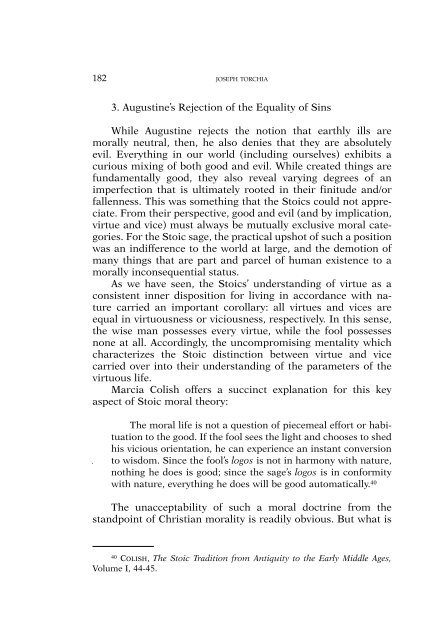Vol. XXXVIII / 1 - Studia Moralia
Vol. XXXVIII / 1 - Studia Moralia
Vol. XXXVIII / 1 - Studia Moralia
You also want an ePaper? Increase the reach of your titles
YUMPU automatically turns print PDFs into web optimized ePapers that Google loves.
182 JOSEPH TORCHIA<br />
3. Augustine’s Rejection of the Equality of Sins<br />
While Augustine rejects the notion that earthly ills are<br />
morally neutral, then, he also denies that they are absolutely<br />
evil. Everything in our world (including ourselves) exhibits a<br />
curious mixing of both good and evil. While created things are<br />
fundamentally good, they also reveal varying degrees of an<br />
imperfection that is ultimately rooted in their finitude and/or<br />
fallenness. This was something that the Stoics could not appreciate.<br />
From their perspective, good and evil (and by implication,<br />
virtue and vice) must always be mutually exclusive moral categories.<br />
For the Stoic sage, the practical upshot of such a position<br />
was an indifference to the world at large, and the demotion of<br />
many things that are part and parcel of human existence to a<br />
morally inconsequential status.<br />
As we have seen, the Stoics’ understanding of virtue as a<br />
consistent inner disposition for living in accordance with nature<br />
carried an important corollary: all virtues and vices are<br />
equal in virtuousness or viciousness, respectively. In this sense,<br />
the wise man possesses every virtue, while the fool possesses<br />
none at all. Accordingly, the uncompromising mentality which<br />
characterizes the Stoic distinction between virtue and vice<br />
carried over into their understanding of the parameters of the<br />
virtuous life.<br />
Marcia Colish offers a succinct explanation for this key<br />
aspect of Stoic moral theory:<br />
The moral life is not a question of piecemeal effort or habituation<br />
to the good. If the fool sees the light and chooses to shed<br />
his vicious orientation, he can experience an instant conversion<br />
to wisdom. Since the fool’s logos is not in harmony with nature,<br />
nothing he does is good; since the sage’s logos is in conformity<br />
with nature, everything he does will be good automatically. 40<br />
The unacceptability of such a moral doctrine from the<br />
standpoint of Christian morality is readily obvious. But what is<br />
40 COLISH, The Stoic Tradition from Antiquity to the Early Middle Ages,<br />
<strong>Vol</strong>ume I, 44-45.
















